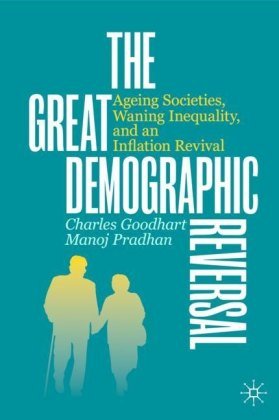The Great Demographic Reversal - Ageing Societies, Waning Inequality, and an Inflation Revival
| Verlag | Springer |
| Auflage | 2020 |
| Seiten | 260 |
| Format | 16,4 x 2,3 x 24,2 cm |
| Gewicht | 542 g |
| Artikeltyp | Englisches Buch |
| ISBN-10 | 3030426564 |
| EAN | 9783030426569 |
| Bestell-Nr | 03042656A |
This original and panoramic book proposes that the underlying forces of demography and globalisation will shortly reverse three multi-decade global trends - it will raise inflation and interest rates, but lead to a pullback in inequality. "Whatever the future holds", the authors argue, "it will be nothing like the past". Deflationary headwinds over the last three decades have been primarily due to an enormous surge in the world's available labour supply, owing to very favourable demographic trends and the entry of China and Eastern Europe into the world's trading system. This book demonstrates how these demographic trends are on the point of reversing sharply, coinciding with a retreat from globalisation. The result? Ageing can be expected to raise inflation and interest rates, bringing a slew of problems for an over-indebted world economy, but is also anticipated to increase the share of labour, so that inequality falls. Covering many social and politicalfactors, as well as t hose that are more purely macroeconomic, the authors address topics including ageing, dementia, inequality, populism, retirement and debt finance, among others.
This book will be of interest and understandable to anyone with an interest on where the world's economy may be going.
Inhaltsverzeichnis:
1. Introduction.- 2. China: A Historic Mobilization Ends.- 3. The Great Demographic Reversal and its Effect on Future Growth.- 4. Dependency, Dementia and the Coming Crisis of Caring.- 5. The Likely Resurgence of Inflation.- 6. The Determination of (Real) Interest Rates during the Great Reversal.- 7. Inequality and the Rise of Populism.- 8. The Phillips Curve.- 9. "Why Didn't It Happen in Japan?": A Revisionist History of Japan's Evolution.- 10. What Could Offset Global Ageing? India/Africa, Participation and Automation.- 11. The Debt Trap: Can We Avoid It?.- 12. A Switch from Debt to Equity Finance?.- 13. Future Policy Problems: Old Age and Taxes, and the Monetary-Fiscal Clash.- 14. Swimming Against the (Main)Stream.
Rezension:
"Charles Goodhart and Manon Pradhan have provided us an impressively articulated, well-reasoned, and thoroughly researched tour de force of the demographic forces that have impacted the evolution of the world economy and their interrelationships over the past 100 years or so ... . the research and thoughtful analysis provide the reader with an insightful window into the policy problems facing developing and emerging economies alike as we face the future." (Robert Eisenbeis, Business Economics, Vol. 56, 2021)
"I appreciate the global scope of this book and its emphasis on the complexity and interconnectedness of the global economy. This is the kind of long-term thinking that economists, policymakers, and othersmay find beneficial." (insurancenewsnet.com, June 25, 2021)
"I think this is a very good forecast. ... The book interestingly comments on an implied cycle in the standing of macroeconomics and macroeconomists. ... their argument is well worth pondering and e ntering into our considerations of the biggest economic risks ahead." (Alex J. Pollock, Law & Liberty, lawliberty.org, May 18, 2021)
"The Great Demographic Reversal is packed with informative charts and tables. It presents a powerful, well-argued challenge to the 'mainstream' view that low growth, inflation and nominal interest rates are here to stay. Above all, its message that everyday economics needs to take demography seriously is surely correct." (Diane Coyle, Financial Times, December 2, 2020)
"This thought-provoking book is a great read, and there is no need to be an economist to enjoy it." (Philip Turner, Central Banking, centralbanking.com, November 16, 2020)
"It is a pleasure to read a book this well argued. There is a good deal of careful analysis and there are lots of tables and graphs." (Charles Taylor, Financial World, November 2020-January 2021)

